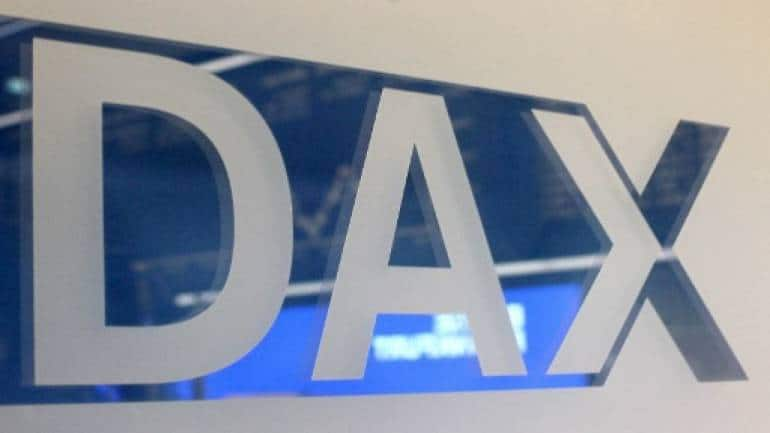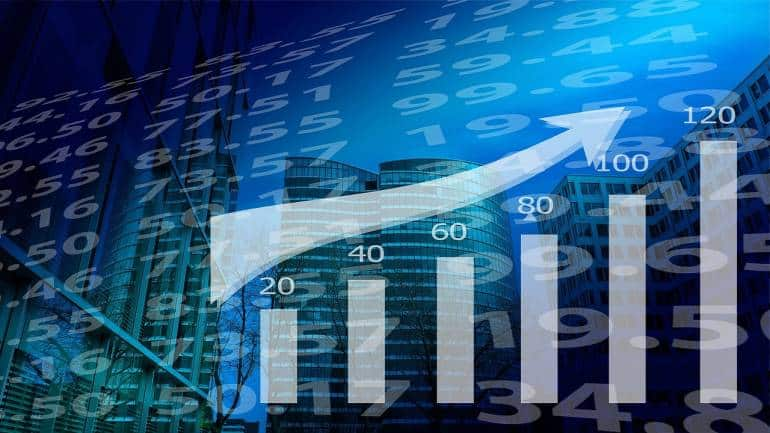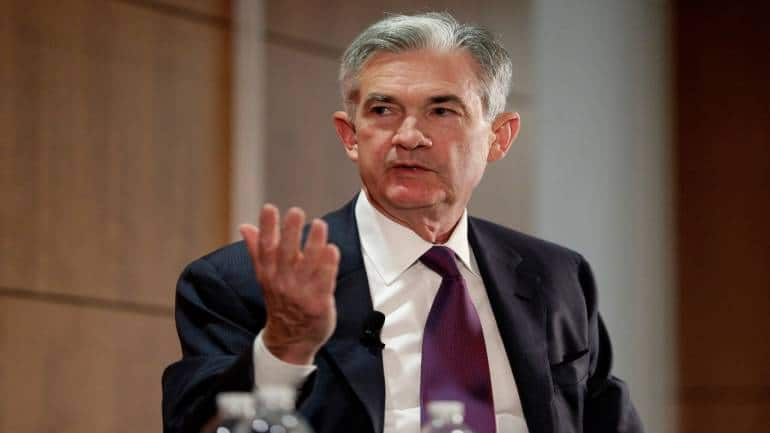German DAX index breaches 16,000 mark for first time
 ]
]
Source: AFP
Germany’s bluechip stocks index on Friday breached 16,000 points for the first time following more record highs on Wall Street overnight as investors shrugged off data showing fresh US inflation pressures.
A jump in wholesale prices added to expectations the Federal Reserve will shift course and pull back on its stimulus efforts, starting with a slowdown in the pace of massive bond buying.
“For now, markets appear… comfortable with that idea,” noted Michael Hewson, chief market analyst at CMC Markets.
“As long as the discussion doesn’t move onto the more sensitive topic of rate rises, then the current trend of… (stock market) highs looks set to continue.”
In Germany, Frankfurt’s DAX 30 index hit a record high of 16,030 points in Friday morning deals.
The first signal of a move to taper huge US stimulus could come as soon as this month when Federal Reserve chief Jerome Powell is due address the annual central banking conference in Jackson Hole, Wyoming.
The worry is that tapering, along with rises to interest rates to contain inflation as economies reopen from lockdowns, could hamper the recovery.
Elsewhere Friday, Asian stock markets closed lower following a broadly positive week.
The fast-spreading Delta virus variant, which is forcing governments to reimpose containment measures, and the Chinese government’s campaign to tighten its grip on the world’s number two economy were also playing on sentiment.
Data on Thursday showed US producer prices rose more than twice as much as forecast on-month in July, while the annual rate hit a record.
The producer price report came on the heels of Wednesday’s consumer price index which showed inflation moderating in July.
“Global investors are assessing the implications of the spread of the Delta virus, the possible tapering by the Fed, and China’s clampdown,” said Geir Lode, of Federated Hermes.
“With equity markets almost doubling since the start of the pandemic and a bull market lasting over a decade, investors are questioning how far the bull market can rally.”
Investors were keeping an eye also on developments in China after officials said they would put in place tougher anti-monopoly rules and penalties over the next five years, as Beijing looks to tighten the screw further after a recent crackdown on a range of industries.
Tech and private equity firms have already been caught in the crosshairs of leaders, and a statement late Wednesday indicated finance, public health, and food and drug manufacturing would also be targeted.
Elsewhere, crude prices extended their recent sell-off fuelled by concerns that the Delta mutation would slam demand, with the International Energy Agency warning as much in a report Thursday.
“The oil market will likely continue to maintain a nervous watch, especially for a deterioration in China and the US,” said Vandana Hari, of energy consultant Vanda Insights, adding that the IEA report “validated fears over a slowdown in second-half demand”.
Key figures around 0915 GMT
Frankfurt - DAX 30: UP 0.5 percent at 16,023.76 points
London - FTSE 100: UP 0.4 percent at 7,221.35
Paris - CAC 40: UP 0.4 percent at 6,908.29
EURO STOXX 50: UP 0.3 percent at 4,238.78
Tokyo - Nikkei 225: DOWN 0.1 percent at 27,977.15 (close)
Hong Kong - Hang Seng Index: DOWN 0.5 percent at 26,391.62 (close)
Shanghai - Composite: DOWN 0.2 percent at 3,516.30 (close)
New York - Dow: UP less than 0.1 percent at 35,499.85 (close)
Euro/dollar: UP at $1.1741 from $1.1733 at 2100 GMT
Pound/dollar: DOWN at $1.3803 from $1.3809
Euro/pound: UP at 85.08 pence from 84.94 pence
Dollar/yen: DOWN at 110.29 yen from 110.43 yen
West Texas Intermediate: DOWN 0.6 percent at $68.67 per barrel
Brent North Sea crude: DOWN 0.1 percent at $71.22 per barrel
Indian equities outperform global peers, Nifty50 surges 18% YTD; will the trend continue?
 ]
]
Indian equity markets staged strong show not only in the last one year but also year-to-date (2021), which is attributable to recovery in growth factors especially after easing Covid-led restrictions, healthy earnings, government and RBI measures, and ample of global liquidity.
The Nifty50 shot up 17.95 percent from the January till August 13, 2021, driven largely by infrastructure, IT, Metals, Energy, Auto and Banking & Financial stocks.
The benchmark index surpassed 16,500 mark for the first time today, hitting a fresh record high of 16,543.60, indicating the month of August is very strong especially after the states in India further eased restrictions which is ultimately expected to boost the further recovery in the economy as well as earnings.
In the same period (YTD), global indices namely Dow Jones Industrial Average surged 15.99 percent, Nasdaq Composite gained 14.96 percent, DAX was up 16.29 percent, FTSE 100 gained 11.65 percent, Kospi was up 10.36 percent, Nikkei 225 up 1.94 percent and Shanghai Composite up 1.24 percent.
“The markets are a function of earnings in the long term and liquidity in the near term. Move away from physical assets and low fixed income rates is leading to significant flow into equities. There is no sign that this migration is going to change anytime soon. This is the short term perspective,” Susmit Patodia, Director, Portfolio Manager at Motilal Oswal Asset Management Company told Moneycontrol.
“Longer term, earnings have been extremely strong as well. We have been in an upgrade cycle for nearly last 4 quarters which has not happened in the last 10 years,” he said.
The Indian index Nifty50, however, underperformed only two major indices which are S&P500 that gained 18.76 percent and CAC 40 that rallied 24.17 percent.
All the central banks so far decided to keep the rates low and maintain the liquidity flow till the consistency in global economic growth, though they are keeping in mind the risk of Covid-19 waves.
“The recovery remains uneven across sectors and needs to be supported by all policy makers. The Reserve Bank remains in “whatever it takes” mode, with a readiness to deploy all its policy levers - monetary, prudential or regulatory. In parallel, our focus on preservation of financial stability continues. At this juncture, our overarching priority is that growth impulses are nurtured to ensure a durable recovery along a sustainable growth path with stability,” said the RBI Governor, Shaktikanta Das in its monetary policy meeting.
Going ahead experts feel the momentum is expected to be supported by the strong earnings activity, flow of liquidity and expected nearly double digit economic growth in FY22.
“Equity valuations are ahead of their fundamentals owing to the signs of growth recovery, government spending and healthy demand outlook from rural economy. This combined with healthy liquidity conditions leads to exuberance in markets and hence, the current rally,” said Rajesh Cheruvu, Chief Investment Officer at Validus Wealth.
Prasun Gajri - Chief Investment Officer at HDFC Life feels while the markets may continue their upward move, what matters, in the end, is the nature of the underlying portfolio as the fundamentals eventually catch up.
- “It is always important to focus on individual stocks and not just on the aggregate market indices. In the current market where stocks across the spectrum are moving up, it becomes doubly important to focus on stocks where the fundamentals are strong and the business models are robust,” he said.
-
The views and investment tips expressed by investment expert on Moneycontrol.com are his own and not that of the website or its management. Moneycontrol.com advises users to check with certified experts before taking any investment decisions.
Stocks rise as Jerome Powell takes cautious stance on stimulus withdrawal during Jackson Hole address
 ]
]
US Federal Reserve chief Jerome Powell
Stock markets jumped Friday after Federal Reserve chief Jerome Powell took a cautious stance on a potential withdrawal of the central bank’s huge economic stimulus measures later this year.
Wall Street rebounded from losses while European stock markets rose after a quiet day as Powell delivered his much-anticipated speech at the virtual Jackson Hole central banking symposium.
Powell’s address to the annual Jackson Hole central banking symposium was closely watched for an idea about plans to reduce the bond-buying that has helped support the pandemic recovery.
Also Read | US Fed chair Jerome Powell hints at tapering of easy money policy by year-end
Analysts say the timing of the taper is crucial as it could also give an indication of when to expect interest rates to go up.
Powell said that despite the impact of the Delta variant of Covid-19, the economy has continued to recover and show strong job growth.
He repeated the Fed’s stance that “it could be appropriate to start reducing the pace of asset purchases this year.”
But he stressed that there was no hurry to raise interest rates, arguing that current inflation pressures will be temporary.
His remarks came after some other Fed members had argued that the bank could taper its asset-buying scheme this year.
“We finally heard from the Fed Chairman and the markets loved it, even though he said what many had expected, that tapering bond purchases could begin before the end of the year,” said Fawad Razaqzada, market analyst at ThinkMarkets.
His comments were “interpreted by the market as the Fed Chair offering no fresh news and people who had betted on him providing some clear tapering timeline were left disappointed,” Razaqzada said.
Asian markets, which closed before the speech, ended the day mixed.
‘Assuaged and reassured investors’
Powell spoke after new official data showed that a key US inflation gauge climbed again last month. Income shot higher, too.
The personal consumption expenditures (PCE) price index – the Fed’s preferred measure of price increases – rose at a rapid 4.2 percent pace in July compared to the same month in 2020.
“Investors brushed off the previous day’s concerns on the taper timetable as Chairman Powell walked a potential tightrope with aplomb,” Interactive Investor analyst Richard Hunter told AFP.
“The balanced rhetoric both assuaged and reassured investors, sending markets sharply higher,” he said.
The surge followed a drop on Wall Street on Thursday, with sentiment jolted by geopolitical concerns after a suicide attack at Kabul airport that left scores dead, including 13 US servicemen.
The bombing, claimed by the Islamic State group, left scenes of carnage outside the airport where thousands of Afghans had massed, desperate to flee their country.
US President Joe Biden, under enormous pressure over his administration’s handling of the Afghan crisis, has vowed to retaliate.
Meanwhile oil prices, which have enjoyed a strong run this week after recent hefty selling, saw more big gains on Friday as traders bought into the view that the Delta variant’s spread will only delay the economic recovery and demand will continue to improve.
OPEC nations and their producer allies will hold their latest virtual output meeting next Wednesday.
Key figures around 1545 GMT
New York - Dow: UP 0.6 percent at 35,435.74 points
London - FTSE 100: UP 0.3 percent at 7,148.01 (close)
Frankfurt - DAX 30: UP 0.4 at 15,851.75 (close)
Paris - CAC 40: UP 0.2 percent at 6,681.92 (close)
EURO STOXX 50: UP 0.5 percent at 4,190.98 (close)
Tokyo - Nikkei 225: DOWN 0.4 percent at 27,641.14 (close)
Hong Kong - Hang Seng Index: FLAT at 25,407.89 (close)
Shanghai - Composite: UP 0.6 percent at 3,522.16 (close)
Euro/dollar: UP at $1.1789 from $1.1752
Pound/dollar: UP at $1.3758 from $1.3700
Euro/pound: DOWN at 85.69 pence from 85.78 pence
Dollar/yen: DOWN at 109.92 yen from 110.09 yen
West Texas Intermediate: UP 1.9 percent at $68.70 per barrel
Brent North Sea crude: UP 1.9 percent at $72.42 per barrel